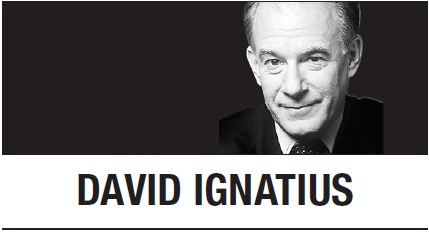
Reading Greg Miller’s gripping new account of President Trump’s entanglement in the Russia investigation, it’s striking just how many of the president’s difficulties have been self-created. Trump sees enemies everywhere around him; he should look in the mirror.
As the book’s ironic title makes clear, Trump has been “The Apprentice” in the White House. New to government, buoyed by sycophantic supporters and his own overweening ego, Trump made mistake after mistake: He turned little problems into big ones; he thought he could misstate, manipulate and escape detection. But, again and again, he failed.
Did Russia have a hand in shaping this unlikely story? Miller wisely leaves that judgment to Special Counsel Robert Mueller. But readers of this tale of hubris may recall the judgment made about Napoleon’s execution of a French nobleman in 1804: “It was worse than a crime, it was a blunder.”
Miller is a Washington Post colleague, and this book draws on reporting by him and many others at the newspaper, so I’m hardly an unbiased reader. It displays what makes us proud to be Post journalists. You won’t find jaw-dropping quotations, as in Bob Woodward’s recent book. It is simply a reporter’s meticulously crafted narrative of how this implausible presidency unfolded -- and how much of Trump’s difficulty has been his own doing.
Miller recounts a chain of error that begins during the campaign. When Trump visits the Post in March 2016, he’s eager to disclose his hastily assembled team of foreign-policy advisers. All were virtually unknown, but two later became very famous indeed: Carter Page, an obscure economist who it turned out had been investigated by the FBI about his 2013 contacts with a Russian spy; and George Papadopoulos, who pleaded guilty to lying about his 2016 contacts with people with connections to the Russian government.
How did these figures get on Trump’s list of advisers? Why were they so eager during the campaign to talk with Russian contacts? Like so much else in the Trump-Russia story, it’s a mystery.
Miller describes Trump as “oddly obsequious in person,” even when his intelligence chiefs briefed him in January 2017 about Russian election meddling. He tells James Clapper, the bald, stocky director of national intelligence, that he “looked good on TV” during a recent hearing. He barely listens to the briefing, interjecting his own conclusion that “there was no impact on the result, right?” He wanders into what would become a consuming scandal of his presidency without seeming to pay much attention.
The wall of denial is shaken when Michael Flynn, Trump’s first national security adviser, is shown to have lied about his conversations with Russian Amb. Sergey Kislyak. Trump seems to think he can bluff and bluster his way through. He tells then-FBI Director James Comey that Flynn “has serious judgment issues,” and then a few weeks later, summons Comey and says: “I hope you can see your way clear to letting this go, to letting Flynn go.”
When Trump fires Comey in May 2017, the White House pretends at first it was all the idea of Rod Rosenstein, the deputy attorney general, upsetting Rosenstein in ways that shake the administration to this very day. Trump “failed to anticipate how Rosenstein would react to being manipulated, or grasp how a provoked deputy attorney general could complicate life for a president,” Miller writes.
“It is hard to overstate the size of the self-inflicted wound that Trump sustained in firing Comey,” concludes Miller. “For someone who built his entire persona on a supposed talent for firing people, Trump had botched this one spectacularly.”
A revelatory passage describes how in the Comey fracas, Trump leaned hard on Daniel Coats, his director of national intelligence, and Adm. Michael Rogers, his NSA director. Trump asked Coats to “intervene with Comey to get the bureau to abandon its criminal investigation of Flynn,” and asked Coats and Rogers “to issue public statements that their agencies had no evidence of any coordination between the Trump campaign and Russia.” These officials, true to their oaths, refused.
Trump’s belief that he can just bulldoze through is evident again when he dictates a July 2017 statement claiming that his son Donald Jr.’s meeting a year before with a Russian lawyer promising dirt on Hillary Clinton was really about “adoption of Russian children.” Trump’s aides had argued instead for a “fulsome statement.” Trump’s statement was “a gross misrepresentation of the facts,” Miller writes, and another perplexing blunder.
Why does Trump behave so often like a trapped prey, whose every move seems to snare him deeper in the web? That’s the central puzzle that emerges from Miller’s fine narrative.
David Ignatius
David Ignatius can be reached via Twitter: @IgnatiusPost. -- Ed.
(Washington Post Writers Group)








